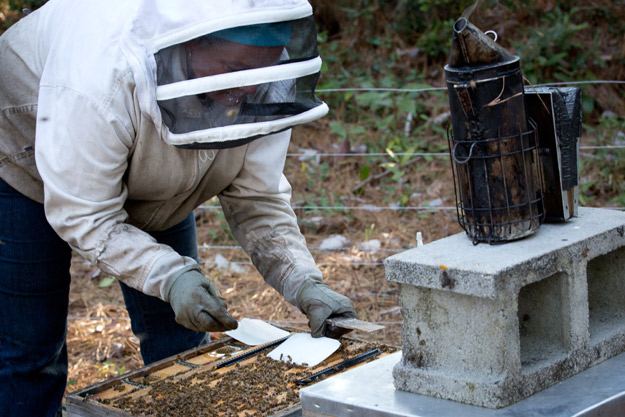Sweet Work
Beekeepers bring local honey to tables

When JILL and BARRY HARRIS arrive at work, they aren’t wearing traditional suits; instead, they’re dressed in hooded, veiled beekeeping masks.
The couple’s honey production business, Silver Spoon Apiaries, began after Barry Harris pursued beekeeping as an item on his bucket list. Now, they extract about fifteen tons of honey each year in more than a dozen bee yards in New Hanover, Brunswick, and Pender counties.
“It’s good to be back out in nature, and it puts you back in tune with the earth,” Jill Harris says. “(Beekeeping) brings you back to your roots.”
During the busiest months of the year, the Harrises spend up to sixteen hours per day in their bee yards, traveling continuous town-to-town circles to requeen, feed, and medicate the hives, or extract the honey. Each yard averages about thirty to forty hives.
No matter how many times they get stung, the ordinarily humble Harris family takes pride in the quality of their honey. Jill Harris appreciates when people buy and eat local foods, but she and her husband say that some grocery stores may claim their honey products are local when they are only locally packaged.
“National brand honey lacks nutritional value,” Barry Harris says. “The higher the temperature and the longer it’s heated, the more healthy antioxidants are lost.”
The taste of honey varies based on the nectar the bees pollinate. Different months yield different flavors and colors. Most of Silver Spoon’s honey develops from the nectar of indigenous plants, such as sweet bay or mulberry, which creates a tangier flavor.
The Silver Spoon logo is “We love our bees, so you will love our honey.” They avoid placing their hives near agricultural areas or neighborhoods to keep the bees away from harmful pesticides and mosquito sprays. Most of the 100 colonies in Wilmington are placed in areas that were formerly farms.
Currently, local beekeeping is largely self-regulated. Although few municipal regulations exist, the Harrises practice “friendly neighbor” policies such as keeping nearby residents informed of their activities. Recent efforts to pass beekeeping ordinances have been shut down.
“For the most part, Wilmington is a very bee-friendly community,” Jill Harris says.
Because surplus honey production only occurs a few weeks out of the year, Silver Spoon medicates its bees to decrease the chance of colony collapse. Beginning in the 1980s, the honeybees suffered due to imported pests and diseases. But the couple avoids medicine-honey interaction by removing honey boxes during treatments.
Recognizing these common struggles, Barry Harris taught a beekeeping course after the couple began the first local beekeeper club, which led to the development of the New Hanover County Beekeepers Association. Silver Spoon still sells bees and beekeeping equipment to many association members.
Nicole Jones, secretary of the club and current owner of two hives, looks forward to the association’s regular tastings of local hobbyists’ honey. The group hosted this year’s North Carolina State Beekeepers Association spring conference in March at the Wilmington Convention Center.
At home, Jones regularly substitutes honey for sugar. She adds at least two teaspoons of honey to her tea every day to ease her allergies, and during the summer, her two young sons eagerly sip on honey-sweetened lemonade.
A hobby beekeeper like Jones might only collect thirty-five pounds of honey a year, the Harrises say, compared to the thousands of pounds that Silver Spoon sells in venues such as Lowes Foods, Tidal Creek Co-op, and Lovey’s Market, as well as small hardware stores and tire shops.
Silver Spoon also maintains a relationship with the Carolina Beach-based shop The Veggie Wagon, owned by Max and April Sussman.
In addition to selling the bottled honey, The Veggie Wagon prepares and sells Silver Spoon honey-based products – honey-flavored ice cream, honey-sweetened bread and butter pickles, honey pecan goat cheese, honey butter, honey habanero hot sauce, and several varieties of granola and granola bars. Some of the products can also be found at Whole Foods Market and Tidal Creek Co-op.
With all the possibilities, Jill Harris experiments in the kitchen, looking to use honey for more than hot tea.
“I make a honey-soy sauce-ginger-red pepper marinade. On venison meat, that’s really good,” she says.
For sweet-tooth cravings, she bakes a honey pecan bar and a honey apple cake. But the family’s favorite is still just honey on warm biscuits – a classic
To view more of photographer Mark Steelman’s work, go to www.marksteelmanphoto.com.